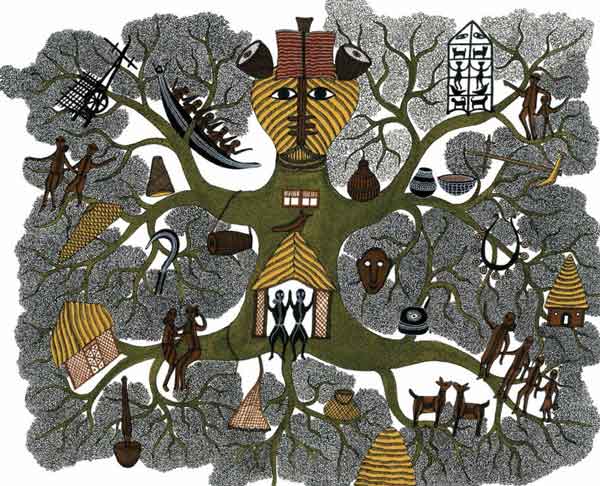
Childhood | Gond art and culture | Trees >>
To enlarge, view other paintings and read the full article, click here >>
My image shows the museum as a tree. It’s a strange tree. Things are a bit upside down and it’s a little frightening. Right on top, I’ve given it the shape of a drum that can be played. The branches are like paths leading to different places – paintings, objects, and houses. People come to look at these things. The tree contains the gods and goddesses of many different communities. – Bhajju Shyam/Gond, Madhya Pradesh
Source: Can it be a peacock or a tree? Tribal and folk artists reimagine museums in new book
Address: https://scroll.in/article/771274/can-it-be-a-peacock-or-a-tree-tribal-and-folk-artists-reimagine-museums-in-new-book
Date Visited: 14 January 2022
Every monsoon, the Gond and Korku tribes of Madhya Pradesh’s Betul and Harda districts celebrate Hari Jiroti. It is a month-long festival of greenery, during which the tribals plant saplings of fruit-bearing trees. “We plant the trees for our children in the memory of our elders who planted for us,” says Fundia Bai Parte of Korku village in Betul. | To read the full article, click here >>
Source: “Protectors dubbed criminals” by Aparna Pallavi (Down To Earth 7 June 2015)
Address: https://www.downtoearth.org.in/coverage/protectors-dubbed-criminals-38993
Date Visited: 14 January 2022
Plantation of Mahua trees needs to be encouraged given the level of depletion of resources. [p. 3]
Scheduled Tribes and other traditional forest dwellers across the country collect and sell a range of forest produces to earn a living. Forest produces not only commands a large share but also a critical element in their livelihood basket. The timing and the cash yielding nature of a large number of forest produces make it an indispensable part of their life. The income from forest produces goes as investment in agriculture, serves as the risk hedging instrument in crop loss years, meets requirements of health emergencies and major consumption expenditures like clothes and festivals.
India has about 16000 recorded plant species. Of these 3000 yield minor forest produces(MFPs).
Nearly 100 million tribals and other forest dwellers of the country depend on MFPs for sustenance and as a supplement to their income. [p. 4]
Source: Report of the Study on Mahua Sub Sector For Chhattisgarh State Institute of Rural Development Department of Panchayat & Rural Development, Govt. of Chhattisgarh Nimora, Raipur (C.G.) – 492015
Accessed: 10 June 2016
[Bold typeface added above for emphasis]
Piplantri village panchayat of Rajasmand district has been saving girl children and simultaneously increasing green cover by their unique initiative of “eco-feminism” >>
For additional learning resources visit the website of the Centre for Science and Environment (CSE), “a public interest research and advocacy organisation based in New Delhi”:
Communication for Awareness
CSE’s publications and informational products have been its strength and they have always combined research and readability to get the message across.

CSE’s tools for awareness raising are periodicals, publications, films/short spots, briefing papers, exhibitions, posters and other products. CSE’s informational products reach people in more diverse ways such as features service, website and e-news bulletins. […]
Source: About CSE
URL: https://www.cseindia.org
Date Visited: 10 July 2022
Find educational and children’s books on tribal culture published in India – Custom search
List of sites covered by this Google custom search engine
https://publicationsdivision.nic.in
To find scholarly books or search Indian periodicals, magazines, web portals and other sources safely, click here >>
Note: hyperlinks and quotes are meant for fact-checking and information purposes only | Disclaimer >>
See also
Accordweb.in | Accord | Articles by co-founder Mari Marcel Thekaekara | Shola Trust
Atree.org | Ashoka Trust for Research in Ecology & the Environment (posts)
Climate change | Audio | The Climate Question (BBC Podcast)
Environmental history and what makes for a civilization – Romila Thapar
Equations blog (Equitable Tourism Options)
Information provided by Indian government agencies and other organizations (FAQ)
Nature and wildlife | Crocodile | Elephant | Tiger | Mangrove forest | Trees
PARI’s tales from tiger territory | People’s Archive of Rural India (PARI)
United Nations on climate change
What is the Forest Rights Act about?
Who is a forest dweller under this law, and who gets rights?